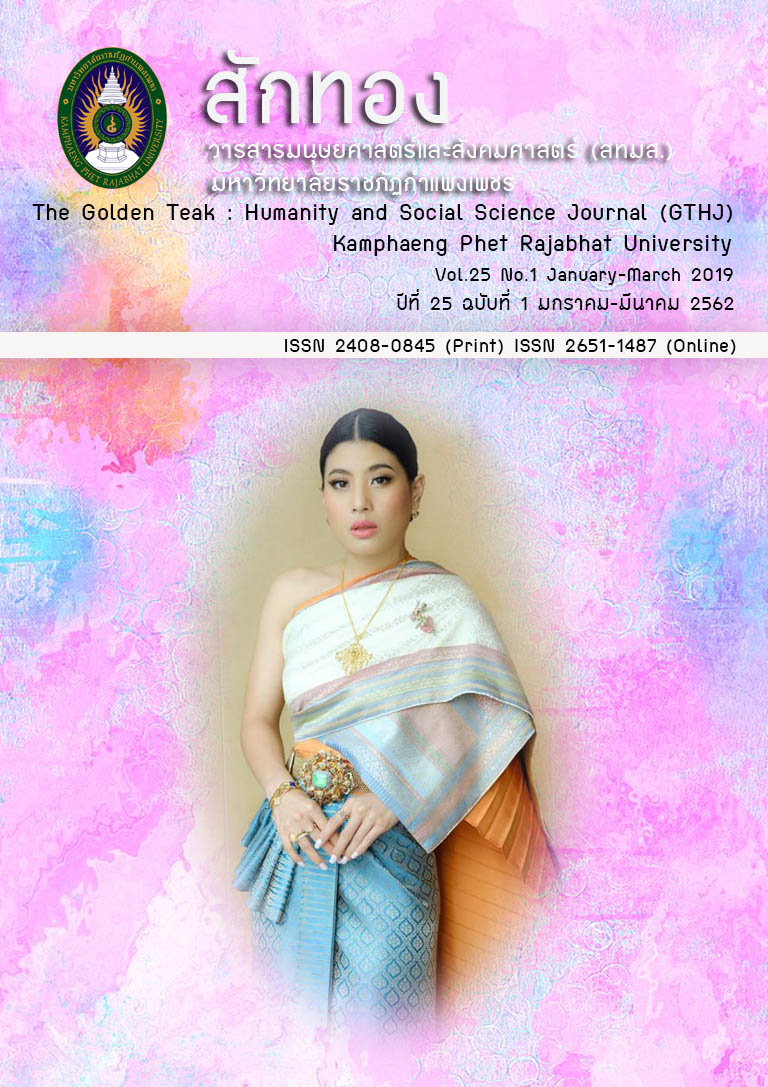The Development of Learning 12 Tenses through Concept Attainment for Teacher Students of Kamphaeng Phet Rajabhat University
Main Article Content
Abstract
The research and development aimed to 1. develop of learning 12 tenses through concept attainment 2. compare pre-post achievement of 12 tenses after learning through concept attainment 3. study the students' satisfaction towards learning 12 tenses through concept attainment. The population was teacher students. The 60 fourth year Physical Education students were selected who learned from the 12 tenses through concept attainment. Research tools were learning process with concept attainment, achievement test and satisfactory evaluation. Analytical statistics was by mean, standard deviation and t-test dependent. The findings were as followed: 1. Development of a conceptual learning 12 tenses: the overall of evaluation of media relevancy and content for learning management through concept attainment were at the highest level (= 4.74). All aspects were appropriate at the high level. 2. Comparison of compare pre-post achievement of 12 tenses after learning through concept attainment: the mean score after the study was higher than before the study at the .05 level of significance. 3. The students' satisfaction towards learning 12 tenses through concept attainment: the overall was at the high level (
= 4.33) The four aspects were considered of the content of English, teacher, teaching in the application, time and facility were all at the high level.
Article Details
บทความที่ได้รับการตีพิมพ์เป็นลิขสิทธิ์ของวารสาร สักทอง : วารสารมนุษยศาสตร์และสังคมศาสตร์ สถาบันวิจัยและพัฒนา มหาวิทยาลับราชภัฏกำแพงเพชร
ข้อคิดเห็นใดๆ ที่ปรากฎในวารสารเป็นวรรณกรรมของผู้เขียนโดยเฉพาะ ซึ่งมหาวิทยาลัยราชภัฏกำแพงเพชรและบรรณาธิการไม่จำเป็นต้องเห็นด้วย
References
Ahmed, I. (2012). A Comparative Study of Effectiveness of Concept Attainment Model and Traditional Method in Teaching of English in Teacher Education Course. Language in India.
Bloom., et al. (1956). The Function of Executive. London : Oxford University Press.
Chareonwongsak, K. (2003). Conceptual Thinking. Bangkok : Success Media.
_______. (2006). Strategic Thinking. Bangkok : Success Media.
Danpanich, S. (2007). The Development of Concept Thinking Model of English Language from Reading. Bangkok : Kasetsart University.
Gardner, L. (2013). Exploring Vocabulary : Language in Action. New York : Routledge.
Jadhav, S. (2013). A study of effectiveness of teaching a unit from English grammar of Class 7th by concept attainment model. Scholarly Research Journal for Interdisciplinary Studies, 2016(2), 61-65.
Khosittrakoon, S. (2008). English Grammatical Ability of Students Using Cooperative Learning Model : STAD Technique. Khonkaen : Khonkaen University.
Kowtrakoon, S. (2013). Educational Psychology. (11 th ed.). Bangkok : Chulalongkorn University.
Marzano, Robert J. (2001). Designing a New Taxonomy of Educational Objectives. Thousand Oaks, California : Corwin Press Inc.
Moonkham, S. (2003). Krob Krueang Rueang Garn Kid. (2 nd ed.). Bangkok : Parbpim.
Pazaver, A. & Wang, H. (2009). Asian Students’ Perceptions of Grammar Teaching in the ESL Classroom. The International Journal of Language Society and Culture, 2009(27), 27-35.
Royal Academy. (1987). Thai Dictionary Royal Edition 1987. Bangkok : Aksorncharoenthat.
Swatevacharkul, R. (2006). The Effects of Degrees of Support for Learner Independence through Web-Based Instruction and Level of General English Proficiency on English Reading Comprehension Ability of Second Year Undergraduate Learners.
Degree of Doctor of Philosophy Program in English as an International Language. Chulalongkorn University.
Wongsothorn, A. (1984). Creation of Test for Pragmatic Communicative Ability, Advancement Level, Concordance with Entrance Examination of English Curriculum, and Teaching and Learning Tendency. Bangkok : Chulalongkorn University.


